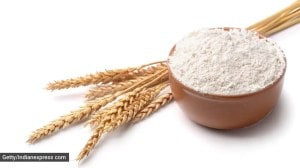A seven-judge Constitution Bench of the Supreme Court, headed by Chief Justice of India DY Chandrachud, ruled that lawmakers facing bribery charges in connection with their speech and votes in the House cannot be immune from criminal prosecution. In doing so, the Court held that claims to parliamentary privilege by lawmakers can be subject to judicial review, and only Parliament cannot have the last word on the issue.
Apart from CJI Chandrachud, Justices AS Bopanna, MM Sundaresh, PS Narasimha, JB Pardiwala, Sanjay Kumar and Manoj Mishra were part of the Bench.

What the law says, what court had to decide
Article 105(2) of the Constitution states: “No member of Parliament shall be liable to any proceedings in any court in respect of anything said or any vote given by him in the Parliament or any committee thereof, and no person shall be so liable in respect of the publication by or under the authority of a House of Parliament of any report, paper, votes or proceedings.”
Article 194(2) provides identical protections to members of state Assemblies.
Before the seven-judge Bench was essentially the interpretation of this provision. This provision was previously interpreted in the 1998 JMM Bribery ruling, so the correctness of that ruling had to be tested.
Interpreting the law on privileges
Tracing the history of parliamentary privileges in India, the SC said that unlike the House of Commons in the UK, India does not have ‘ancient and undoubted’ rights vested after a struggle between Parliament and the King. These rights in India, even during colonial times, have flown from a statute, which after independence transitioned to a constitutional privilege. This the court cited as reason to interpret privilege in a way that fits with the larger ideals of the Constitution.
There are two components of parliamentary privilege. One is what the House exercises collectively — which would include the power to punish for its contempt, the power to conduct its own affairs, among others. The second is for individual rights — say exercise of free speech by each member. This, the court said, has to pass a test.
The ruling cited the “necessity test”, which means that for a member to exercise a privilege, the privilege must be such that without it “they could not discharge their functions.” Naturally, accepting bribes cannot be said to be necessary to discharge one’s functions as a lawmaker, unlike, for example, having the right to free speech.
Story continues below this ad
The court also said that the Constitution envisions probity in public life. “Corruption and bribery of members of the legislature erode the foundation of Indian Parliamentary democracy. It is destructive of the aspirational and deliberative ideals of the Constitution and creates a polity which deprives citizens of a responsible, responsive and representative democracy,” the ruling stated.
Graft-vote or vote of conscience
The court also had to decide if a lawmaker gets immunity if he accepts a bribe but votes as per his conscience or party line and not as per the request of the bribe-giver. Essentially, without a quid pro quo, can accepting money still be equated to graft?
The Court analysed Section 7 of the Prevention of Corruption Act, which deals with ‘offence relating to public servant being bribed’.
“The mere “obtaining”, “accepting” or “attempting” to obtain an undue advantage with the intention to act or forbear from acting in a certain way is sufficient to complete the offence. It is not necessary that the act for which the bribe is given be actually performed,” the court said.
Story continues below this ad
This means that accepting a bribe is an offence as is, and it does not depend on whether the public servant acted differently.
The Court also said that it would be a violation of the right to equality under Article 14 of the Constitution to create “an illegitimate class of public servants which is afforded extraordinary protection.” Such a classification, the court said, would be manifestly arbitrary.
Court’s power
Since Parliament also has the power to punish its members for contempt — the punishment here could be suspension from the House and even sentencing to jail term — the SC had to decide whether this meant courts had no role to play.
The SC held that both the court and Parliament can exercise jurisdiction on the actions of lawmakers in parallel. This is because the purpose of punishment by the House is different from the purpose of a criminal trial.
Story continues below this ad
“The issue of bribery is not one of exclusivity of jurisdiction by the House over its bribe-taking members. The purpose of a House acting against a contempt by a member for receiving a bribe serves a purpose distinct from a criminal prosecution,” the court said.








































